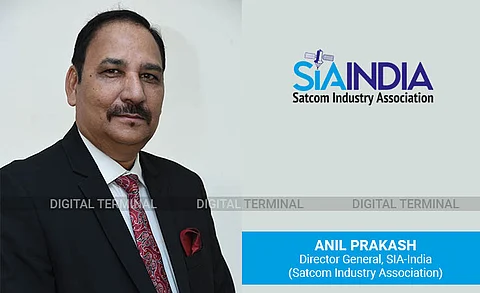

The Indian space programs have got a boost in past few years due to technological advancements and the government’s focus on making India a leader in the space sector. Moreover, the increased participation of private players in India’s space programs has enabled India to tap the opportunities and boost our presence in space market. Today, the role of private players has increased multifold and it is enhancing India’s space capabilities. Also, the government is willing to bring reforms in the space sector. The government’s policies are helping the stakeholders to speed up their growth and develop India’s space ecosystem further. SIA-India is a vibrant young industry body, strives to extend the benefits of SatCom innovation and technology development to the society as a whole. Rajeev Ranjan, Editor, Digital Terminal recently interacted with Anil Prakash, Director General, SIA-India. Mr. Anil shared his views on India’s journey in the space sector, participation of private players and the government’s focus in this sector. Read below the excerpts:
Rajeev: How do you see the participation of private players in India’s space programs?
Anil Prakash: The space economy worldwide is a mammoth USD 440 bn in 2020 and India’s share does not reflect the position like it should. The next giant leap to get a rightful slice of the pie of the world space economy can only be achieved by private sector role in the end-to-end participation of private sector as co-travellers in the national space economy, by exploiting the space capabilities for fulfilling the unmet needs of the nation and tapping into domestic and international markets. With the right mix of regulatory landscape and policies in place, India has the potential to become the space hub for global companies.
Rajeev: Which are key factors helping the private players to get a breakthrough in space programs?
Anil Prakash: The past engagement of the private sector as vendors has helped develop industrial capabilities within the country for advanced space programs. Moving ahead the private sector needs funding, technology and opportunities to build not just the industrial capability but also a capability to engage in all space related upstream, midstream and downstream activities. The industrial capability itself needs to leverage its maturity to ensure a strategic position in the global space supply chain. Defence has been a major user of the space sector worldwide and in recent times we have seen an earnest interest for use of space capabilities to add a strategic depth to India’s Defence preparedness.
The entire value chain of academia outreach, technology transfers for commercialization, start-up incubation, IPR creation, valuation etc needs to be nurtured. While the existing startups hold a lot of promise, market size can support many more and this is established by a similar situation in other countries. An integrated strategy for development of the ecosystem needs to be supported by bold policies and a regulatory landscape allowing businesses to flourish. A beginning has been made starting with the Hon’ble Prime Minister’s announcement to unlock the potential of the Space Sector in June 2020 followed by the government’s decision to open the sector for private players, the establishment of IN-SPACe to provide a level playing field in satellites, launches and space-based services, provisions and a better regulatory environment with single window clearance policy.
With ISRO opening their haloed precincts for private sector to share IPR and infrastructure, the private players have an opportunity to make a mark in the thus-far limited scope. Large space manufacturing companies connecting with small industries and startup companies for services and components paves the way for many new businesses to grow. Kerala, Karnataka, Andhra and Odisha etc. are building Space parks to facilitating cluster manufacturing approach to the space sector.
FDI rules allowing foreign companies to set-up facilities in India and enabling 100% Foreign Direct Investment in the space sector is a huge step forward. Lately ISRO has been signing MOUs with startup businesses and going one step forward is also enabling startups to utilize ISRO’s facilities to perform various processes and functions, besides offering mentoring support which would further help the firms immensely.
Rajeev: How are GoI’s effective policies in space technology helping the Indian Satcom Ecosystem?
Anil Prakash: While we do appreciate the earnest intent of the government in various new consultations, policy interventions, and recommendations by DoS, DOT, TRAI etc., these bits and pieces do not add up to a seamless and comprehensive framework to create an environment that brings in opportunities, funding and technology together.
Though NDCP 2018, announced by DOT, places more reliance on satellite communications and calls for “strengthening satellite communication technologies in India”. The geospatial industry will get a major boost with the liberalization of geospatial data acquisition and simplifying cumbersome certification and license process.
Rajeev: What are some of the critical issues for entire stakeholders? What are your efforts to drive the government’s notice towards these issues?
Anil Prakash:
Rajeev: How do you look at the significance of IN-SPACe? How will it benefit ISRO as well as the nation to grow presence in space?
Anil Prakash: Setting up IN-SPACe shows the Govt. is willing to bring in reforms in the space sector. This will restore confidence among the investors, creating an institutional framework for utilizing space assets from ISRO to private industry etc. In-space is set to create an institutional framework for single window approvals and permissions for the private sector players in Space Industry.